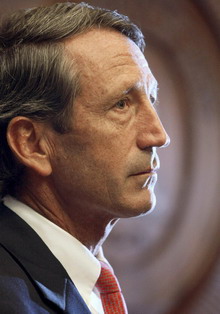highlights
US governor's impeachment hearings begin
(Agencies)
Updated: 2009-11-25 10:36
COLUMBIA, South Carolina: State legislators upset with South Carolina Governor Mark Sanford's disappearance to see his lover in Argentina began a months-long process on Tuesday that could ultimately remove the two-term Republican from office.
|
 South Carolina Governor Mark Sanford addresses the media at a news conference at the State House in Columbia, South Carolina September 10, 2009. [Agencies] |
The panel of the state House Judiciary Committee that's debating impeachment discussed his five-day absence in June and problems related to it, including the failure to put someone in charge of the state while he was gone.
At an hour-long meeting, the panel's seven members also talked about how they would proceed with at least three more hearings in early December. The next one is scheduled for next Tuesday, and a vote by the panel is expected by the second week of December.
"He left his post, he left his state. He left his country without notifying anyone in authority," said state Rep. Greg Delleney, a fellow Republican.
The governor's lawyer said in a later statement that those don't constitute "a serious crime or serious misconduct in office that has corrupted the system of government in South Carolina."
"This standard is intentionally high," attorney Ross Garber said in a statement Tuesday. "The Governor's temporary absence from the state in June does not meet this high standard."
Delleney conceded Sanford hadn't committed a serious crime but said lawmakers decide what the threshold is for "serious misconduct," the second element allowed for impeachment.
Eight US governors have been removed by impeachment, and the only two removed in the last 80 years each faced criminal charges. Standards for impeachment vary by state.
The four Republicans and one Democrat who co-sponsored the impeachment measure say Sanford was derelict in his duty and wrong to mislead staffers into thinking he was hiking the Appalachian Trail, which is in the US, while he was really in Argentina.
If the impeachment measure passes the panel, it would head to the full Judiciary Committee. From there it would need a majority vote of the 25 members to get it to the House floor in January for debate. A two-thirds vote in favor would result in Sanford's suspension.
The Senate, acting as jury, then would decide whether Sanford would be removed from office, which would also require a two-thirds vote. His second and final term ends in January 2011.
Sanford has been under scrutiny and pressure to step down since admitting to an extramarital affair with Maria Belen Chapur, the Argentine woman whom he has called his "soul mate."
The governor told reporters in Charleston on Tuesday that it's obvious he wanted to keep an affair secret.
"Yes, I had a moral failing. I was gone for five days. I failed my marriage on a number of fronts. I mean, we've been through all of that. I don't know how many times one apologizes for that," he said. "How many times do we want to say the obvious? The nature of having an affair is you want to hide it."
During its upcoming meetings, the panel will also discuss the 37 civil charges Sanford is facing following a three-month State Ethics Commission probe. Among other violations detailed Monday, Sanford is accused of using taxpayer money for high-priced airplane tickets that took him around the world and to Argentina.










